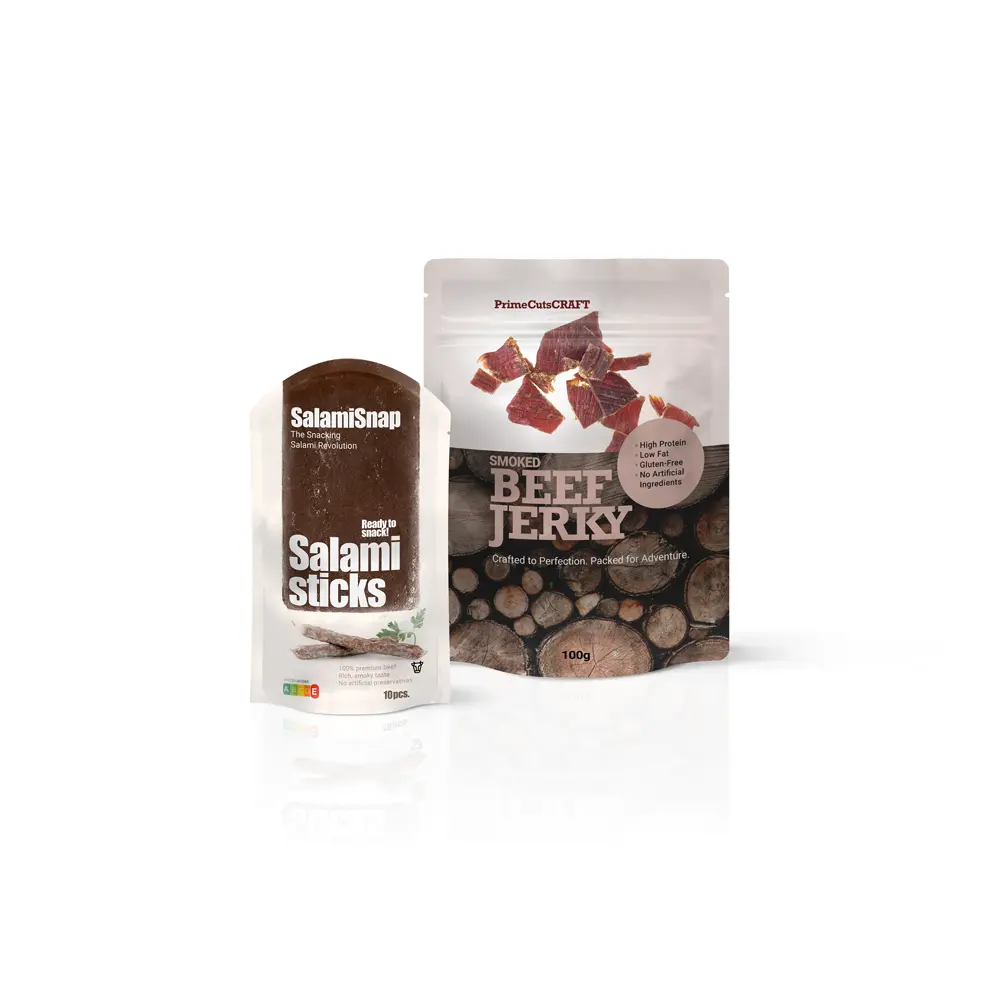Meat and meat substitute products are available in various types and shapes. From salami sticks or slices to bacon bits and beef jerky, a wide range of meat products are filled and packaged on our machines. Primary packaging is important in terms of product protection and shelf life. During filling, the product must be deposited into the pouch in a compact and controlled manner.
High filling speed
thanks to individual dosing concepts
Meat and substitute products are available in many different shapes and sizes. In the packaging process of salami sticks, for example, it is important to fill them into the pouch in a compact and controlled manner. For this purpose, specific dosing- and filling hoppers are used to ensure a smooth product flow.
Long product shelf life
thanks to minimal residual oxygen levels in the pouch
Gas-tight pouch packaging is essential to ensure that high-quality fruit retains its aroma and maximizes shelf life. To ensure that the salamis and dried meats retain their aroma and the shelf life is maximized, the residual oxygen value in the pouch must be reduced to a minimum. We achieve this with our complex product protection gassing.
High flexibility
Our machines can produce small sachets, such as three-sided or four-sided sealed pouches, as well as bottom-fold and stand-up pouches. Sealing a reclosure system, such as a zipper, is also possible. The filling weights generally range from a few grams to several kilograms. Individual pouch contours can also be produced using various contour punches.
Quick and easy format changes
Depending on the format and machine type, format changes are possible in just a few minutes and, in some cases, even without tools. Production and machine parameters for individual products and formats can easily be load in the operating panel (HMI) via integrated recipe management. Short format- and product changeover times significantly reduce the non-productive time (downtime) from the machine and ultimately ensure higher machine utilization and higher productivity.
Durable machine design
The environmental conditions in which meat products are packaged and filled can be very demanding for the packaging machine. For example, our pouch packaging machine is built in stainless steel to protect it from moisture and corrosion. Our specific hygienic design is also available for extreme requirements.
Low space requirement due to the rotary principle
We have always stood for horizontal rotary machines (HFFS). This machine principle requires little space in production, particularly due to working with a rotary table. We can offer pouch packaging machines with integrated dosing systems with a base area of 12 m².
The space advantages of our rotary machines are becoming increasingly apparent, especially with multiple machines.
The control cabinet can also be integrated into specific machine models, simplifying the machine's handling and commissioning, saving space compared to an external control cabinet, and improving accessibility.
High-quality products deserve premium pouch quality
The essence of designing a pouch

Stand-up bottom
An additional fold in the packaging material creates a pouch's stand-up base. This very stable base construction enables the pouch to stand independently on a flat surface. In addition to the primary function of being able to stand on its own, the stand-up bottom and the resulting bottom fold give the pouch a higher filling volume than a flat pouch. The bottom shape can usually be round, as in doypacks, or trapezoidal, as in deltapacks.
Tear opening notch
The tear-opening notch is a punched hole in the upper side seal seam of the pouch. This punching makes it easier for the consumer to tear open the pouch without tools and consume the contents. The tear-opening notch is usually designed as an incision or punched-out arrowhead.
Side sealing seam
The side sealing seam is the two sealed pouch edges and closes it in this area. The side sealing seam requires exceptional quality and strength. Its width can be freely selected according to the length of the pouch. Depending on the contents, filling quantity, and size, the pouch must be able to withstand various pressures and sealing requirements. Optical and functional sealing patterns, such as cross and ripple patterns, can also be created in the sealing seam.
Top sealing seam
A top sealing seam permanently closes the pouch after filling. The side sealing seam requires exceptional quality and strength. Depending on the contents, filling quantity, and size, the pouch must be able to withstand various pressures and tightness requirements. In addition to the technical requirements, wider top sealing seams are often produced to give the pouch a corresponding appearance. Additional functions like hanging devices (euro hole or round hole) are integrated into the top seam.
Sealing seam quality
Sealing seam quality is one of a pouch`s core criteria. It must meet a wide range of quality and functional criteria. Thanks to our innovative and high-quality sealing technology, our machines can guarantee consistently high sealing seam strength over the long term. This also applies to different packaging materials and mono-materials.
Processability of mono-materials
All of our new machines can process recyclable mono-materials as standard. Thanks to innovative unwinding and sealing technology, new and thinner films and papers can be processed at the same quality and speed.
Overview of common pouch details
Details that really matter
-
Stand-up bottom
An additional fold in the packaging material creates a pouch's stand-up base. This very stable base construction enables the pouch to stand independently on a flat surface. In addition to the primary function of being able to stand on its own, the stand-up bottom and the resulting bottom fold give the pouch a higher filling volume than a flat pouch. The bottom shape can usually be round, as in doypacks, or trapezoidal, as in deltapacks.
-
Tear opening notch
The tear-opening notch is a punched hole in the upper side seal seam of the pouch. This punching makes it easier for the consumer to tear open the pouch without tools and consume the contents. The tear-opening notch is usually designed as an incision or punched-out arrowhead.
-
Side sealing seam
The side sealing seam is the two sealed pouch edges and closes it in this area. The side sealing seam requires exceptional quality and strength. Its width can be freely selected according to the length of the pouch. Depending on the contents, filling quantity, and size, the pouch must be able to withstand various pressures and sealing requirements. Optical and functional sealing patterns, such as cross and ripple patterns, can also be created in the sealing seam.
-
Top sealing seam
A top sealing seam permanently closes the pouch after filling. The side sealing seam requires exceptional quality and strength. Depending on the contents, filling quantity, and size, the pouch must be able to withstand various pressures and tightness requirements. In addition to the technical requirements, wider top sealing seams are often produced to give the pouch a corresponding appearance. Additional functions like hanging devices (euro hole or round hole) are integrated into the top seam.
-
Sealing seam quality
Sealing seam quality is one of a pouch`s core criteria. It must meet a wide range of quality and functional criteria. Thanks to our innovative and high-quality sealing technology, our machines can guarantee consistently high sealing seam strength over the long term. This also applies to different packaging materials and mono-materials.
-
Processability of mono-materials
All of our new machines can process recyclable mono-materials as standard. Thanks to innovative unwinding and sealing technology, new and thinner films and papers can be processed at the same quality and speed.
We are happy to support you in your pouch packaging project with customized machine and dosing technology.
We look forward to your inquiry.
Phone: +49 2267 699-0
Email: sales@sn-packaging.de
FM 060
Horizontal form, fill and seal machine (HFFS) simplex
Format range pouch width
40 – 220 mm
Format range pouch height
50 – 250 mm
Realistic output rate
up to 60 pouches/min.
Exemplary yearly production output (single shift)
about 6 million pouches
(Data dependent on filling properties, pouch size, and production times)
FBM 22
Horizontal form, fill and seal machine (HFFS) duplex
Format range pouch width
120 – 190 mm
Format range pouch height
100 – 350 mm
Realistic output rate
up to 120 pouches/min.
Exemplary yearly production output (single shift)
about 13 million pouches
(Data dependent on filling properties, pouch size, and production times)
FMH 300
Horizontal form, fill and seal machine (HFFS)
Format range pouch width
115 – 194 mm
Format range pouch height
80 – 350 mm
Realistic output rate
up to 180 pouches/min.
Exemplary yearly production output (three shifts)
about 50 million pouches
(Data dependent on filling properties, pouch size, and production times)

Contact
We are happy to support you in your pouch packaging project with customized machine and dosing technology.
We look forward to your inquiry.
Phone: +49 2267 699-0
Email: sales@sn-packaging.de









